- Home
- Alison Booth
A Perfect Marriage Page 18
A Perfect Marriage Read online
Page 18
He expected me to take a step back but I didn’t. By this time I knew that Zoë was standing right behind me and that Jeff could now see her. I heard her sharp intake of breath as Jeff raised his hand. He smacked my face hard. Though I could feel my cheek stinging, I ignored the blow. Stepping forward, I shoved him on the chest with both hands. He lost his balance, and pirouetted on the landing in front of me for a second that seemed to stretch into infinity. I couldn’t help noticing how graceful he was, even when drunk, even when trying to regain his balance. As graceful as a ballet dancer.
He appeared oblivious of the banister to his side, unmindful of the steep drop behind him, or perhaps he was just so drunk that he didn’t know quite where he was. I got as far as raising my hand to reach out to still that endless pirouette. But I waited a fraction too long and I was too late to secure him. Abruptly, as if it had a will of its own, my hand dropped by my side. As in a slow motion movie, he fell backwards down the staircase. His body made a thumping sound on the stair treads as it fell. At the bottom lay that tessellated encaustic tile floor. He landed hard onto it and his body crumpled up. But it crumpled elegantly. Even in an accident Jeff was stylish. He didn’t cry out. It was possible that nothing would break him. But he was very still.
For a moment neither Zoë nor I said anything, and my limbs felt as if paralysed. It was the eruption of Mrs Gates through her front door that broke the spell. ‘I saw him hit you a minute ago,’ she said. ‘So I rang the police.’
‘Better ring for the ambulance too.’ Zoë pulled her mobile out of her pocket.
‘That mightn’t be necessary,’ Mrs Gates said.
Jeff was already sitting up. He looked shaken but I was relieved that he was able to get to his feet. Mrs Gates backed away yet she needn’t have worried. Though Jeff was now standing upright, he was less steady on his feet than before his fall. He didn’t look at any of us as he turned away and lurched out the front door. This time he slammed it shut so hard that its stained glass panels undulated slightly but they did not shatter.
By this point I was starting to worry about what the police would say when they learned that I had shoved him. Did I push him down the stairs or did I just push him away from Zoë and me? Whatever I’d done, it was in self-defence. But I was glad he could walk away.
‘Did you see anything?’ Zoë called out to Mrs Gates.
‘Yes, like I said. I heard quite a ruckus with all that shouting and when I came into the hallway and looked up I saw him hit Sally. Who is he?’
‘My husband,’ I said, my voice cracking. ‘We’re separated though.’
‘Can’t say I blame you, love.’
‘We’ll tell the police exactly what happened,’ Zoë said to me, her arm around my shoulders. ‘He shouldn’t have been trying to reach me, not with that non-molestation order, and he was about to beat you up. Well, he’d already begun, hadn’t he? That was quite a blow to your face. You’ll be bound to get a bruise. There’s a big red mark there and his signet ring must have cut the skin, there’s a bit of blood too.’
I pulled a tissue from my pocket and dabbed at the drops of blood. Already my cheekbone was starting to throb.
‘And he would have begun on me next,’ Zoë added. ‘If you hadn’t stopped him.’
‘I know. You’re the reason he was here,’ I said.
‘The only person to blame is Jeff,’ Zoë said firmly. ‘It’s not you. It’s not me. It’s Jeff. You’re brave, Sally. And don’t you forget it.’
‘The worm has turned,’ I said.
Uncertain whether to laugh or cry, I sat down on the top step and noted dispassionately that I had begun to shake all over. I was still sitting there, shivering as if I had a fever, when the police arrived and Zoë, assisted occasionally by Mrs Gates, guided them through an account of what had happened. Later it was my turn. Later; after I’d recovered from the shock.
Chapter 39
NOW
‘And that was just the beginning of it,’ I tell Charlie. Of course I’ve given her an edited version of what happened that dreadful night. I haven’t mentioned that I got as far as raising my hand to reach out to still Jeff’s seemingly endless pirouette. I haven’t mentioned that I’ve sometimes wondered since then if I might have saved him from that fall.
Zoë and Mrs Gates were good witnesses and I’m sure it helped me that Jeff had ignored the non-molestation order the police had taken out on Zoë’s behalf. It was clear to everyone that I had pushed him in self-defence. Lightly I touch my cheekbone. Jeff’s blow to my face that night had broken the skin, and left a blotch that took months to fade. Zoë’s face was marked forever by Jeff’s assault. Though the cut above her eye had healed quickly, it left a thin scar that even now, even after all those years, bisects her left eyebrow.
‘After he fell down the stairs that night,’ I tell Charlie, ‘we thought he was OK. He got up almost immediately and was out the front door as quick as can be, and at that stage no one knew where he went.’
I stand and pace around Charlie’s bedroom as I struggle to find the words to describe what happened later. Omitting the ghastly details, I begin to relate an abridged version. The terrible anxiety I’d felt after learning after the inquest of the subdural haematoma that can come on after a major trauma to the head. Usually within twenty-four to forty-eight hours, but sometimes even longer. And the substances he’d been taking hadn’t helped.
Once I’d identified him at the mortuary, things started to get serious. You’d think I might have thought about this on the train back to London to view his body but I hadn’t. It had been a terrible shock to discover that I was to be extensively interviewed under caution by officers from the Criminal Investigation Department.
* * *
In the interview room, a solicitor was sitting next to me, a short woman with a deep voice that seemed surprising for her slim frame. How she got there I had no idea. The CID men sat opposite me. The older one had a head like a hard-boiled egg that could be cracked open with a spoon, and with pale blue, watery eyes that left my face only to glance at his notes. The second man was tall and stooping, with black hair going grey around the temples and a long narrow nose that looked as if it had been broken once or twice. Like burrs on a woollen sock, these details adhere to my memory.
The confusing emotions that meeting generated are also with me still. Relief and guilt. Relief at knowing that the burden of what had happened to me over the years was at last known to the police and that it couldn’t happen again now that Jeff was dead. Guilt – which I kept bottled up tightly inside me – because I felt that I was responsible for Jeff’s death.
Yet the substance of our conversation that day has mostly vanished from my head; I retain only the impression that it was more interrogation than interview. I can recall that they asked a lot of questions but I can remember only two of them. Was it really true that Jeff had been violent to me before? And if that was the case, why hadn’t I gone to the police earlier to lodge a complaint?
While struggling to respond, again and again I had thanked Mrs Gates for calling the police. Not aloud of course, it was merely a refrain that penetrated my thoughts all through that interminable interview, like a mantra that kept me going. Thank you, Mrs Gates. Thank you so much, Mrs Gates. What a good neighbour you are, Mrs Gates. Without the logging of the incident at the top of the staircase that evening just a few days before, without Zoë’s and Mrs Gates’ witness statements, things might have gone far worse.
* * *
‘In the end there was a decision not to prosecute,’ I tell Charlie. ‘They decided the circumstances amounted to justifiable and proportionate self-defence. Afterwards I slept for eighteen hours solid. Somehow my name was kept out of the news-papers but Zoë’s wasn’t.’ Jeff had lost his identity by then; the media knew him solely as Zoë’s assailant. Then they lost interest when the next scandal came along.
‘Was that why you were away from Coverack for so long?’ Charlie says.
‘Yes.’
‘I
thought you were working. That’s what Gran said.’
We sit in silence apart from the distant hum of late Saturday night traffic down the A-road half a mile away. Through the crack in the curtains I can see the orange of the sodium street lamps that give London streets such a characteristic light at night. Eventually I say, ‘We wanted to protect you, Charlie.’
But there is no response. Turning away from the orange glow, I see that Charlie has fallen asleep sitting up. Just like that: here one minute and gone the next. Gently I ease her down onto the pillows, pull the duvet over her, and switch off the lamp.
The house feels cold; the central heating must have turned itself off hours ago. Quickly I brush my teeth and climb into bed but find I can’t sleep. Thoughts crowd into my head; the events of the last twelve hours play and replay themselves. Jeff is still influencing our lives even though he’s been dead for ten years. Jeff has come back to haunt us, and Anthony has gone.
In bed I cannot get comfortable. I wind the duvet round me like a roll around a sausage, its softness wrapping me in a warm embrace. Anthony was glad to make his escape from this household. Should I have left him in the kitchen while I spoke to Charlie? Afterwards I could have gone downstairs and explained my past to him. But that opportunity has gone. He will never contact me again now he knows what things are like here; now he has seen Charlie at her worst, now he knows about my past. I try not to think of him, I try not to think of the abrupt way we said goodbye.
I turn over again and feel for my tissue. Poor Charlie. The fixed points of her life are fixed points no longer. Perhaps I’ve protected her too much. She should know that Jeff was a weak man. His physical violence was the action of someone who was fundamentally weak. Perhaps if he had lived longer he might have learned to control his rages, perhaps he might have learned that these were destructive of that most valuable of things – the delicate relationship between human beings. But then again he might never have acquired this understanding. He might have continued to blame other people for his actions, and to view the violence he meted out to the women he said he loved as a punishment necessary for their own good.
I switch on my bedside lamp and sit up. I try opening the novel that I keep on the bedside table to read each night, but I am so tired it’s impossible to concentrate. After five minutes I turn out the light again, but as soon as my head touches the pillow thoughts of Jeff come crowding, thronging back.
I remember the countless arrangements I made in the months after the inquest in order to establish a new life for Charlie and me. But something important had gone, Jeff had gone; and he took with him many of my dreams. Before Jeff’s death I knew that our marriage was over, but I also knew that he was still there; the father of my child was still there. After he died the past flooded back, every action that I took was associated in some way with my earlier life with him.
It was such a painful process packing up the house in Islington that we’d once owned jointly and that I now owned completely, mortgage and all. Zoë offered to help me. We had become goods friends by then but I didn’t want to do it with her. I needed to do it alone. I was not merely packing up material things – deciding what to keep, what to give away, what to throw away – I was also trying to pack up memories. Those memories of Jeff’s and my life together could not be as easily disposed of as our material possessions. Those memories are baggage I shall always carry with me.
It’s no use trying to sleep; I might as well get up again. I put on my dressing gown and go downstairs. The Scrabble board is still on the coffee table; the game Anthony and I will never complete. I look at the words spread out on the board. There is the word ‘luck’ that I put down, and which Anthony extended to ‘lucky’ with his addition of ‘yard’. Lucky, that’s what I am; lucky that Charlie came home. This is the most important thing. This is what I will focus on.
I sweep all the tiles into a heap in the centre of the board and slide the lot into the cardboard box. After picking up the vase of red roses from the floor, I restore it to the centre of the coffee table. The blooms, tight buds when I put them in water last night, have begun to open. By some trick of light they glow as if illuminated from within; they appear almost incandescent. I touch them but they feel cold and slightly clammy. I bury my face in the fleshy petals. The roses have no scent; they are bred only for their appearance.
A symbol of love.
They will be dead by the middle of the week.
I go down to the kitchen. There on the bench top is all the crockery that Anthony unloaded from the dishwasher. He has an orderly mind; the dishes and glasses are ranked by size. I pull open the cutlery drawer, expecting to see the knives and forks similarly aligned. It’s almost a relief to see that Anthony chucked them in, higgledy-piggledy, any old how. I put on the kettle and, while the water heats, look out the window. The dark sky is sparsely dusted with a few stars and to the east there is a streak of paler blue. It will soon be light.
Charlie’s father was only fourteen years older than she is now when he died. She has a tough time ahead of her, reinterpreting the past after the loss of many of the old certainties. I wish it had all been different for her. I wish it had been as she’s believed it to be up until today. I concealed the truth to protect Charlie. And she thinks I did it because I was protecting myself. That I am so frightened of making a mistake that I cannot admit that I ever did.
What were Charlie’s exact words? Yes, I can remember them now. ‘Everything always has to be perfect with you.’
But it was not just that. I struggle against my fatigue to retrieve the thought I filed away after she had made that statement. It was important; I know it was important but it eludes me. I think that it had something to do with ex ante and ex post, before and after, but I can remember nothing more than this.
While I drink my tea, the clock chimes half-five. Exhaustion engulfs me. I go upstairs to the bathroom and wash my face. A pallid face with swollen eyelids looks back at me from the mirror over the washbasin. It’s not an attractive sight. I return to bed, insert sponge plugs into my ear canals, and fall at once into a deep and dreamless sleep.
Chapter 40
NOW
‘Coffee, Mum.’ I open my eyes to see Charlie standing by my bed, a steaming mug in her hand. The mug with 99% PERFECT stencilled on its side. She is smiling at me, her face tranquil and unmarked by the tears and emotion of last night. ‘It’s midday,’ she says.
‘Seize the day,’ I mumble as I pull out the sponge earplugs and struggle to sit up. ‘Carpe diem.’
She puts the mug on the bedside table and perches on the edge of the bed. The back of my head is thumping, my neck and shoulders are stiff, my nerves are stretched taut.
‘Love you, Mum,’ she says.
Her words undo me and I begin to bawl, great wracking sobs that make my sinuses tingle. She puts her arms around me. Between sobs, I gulp out the words, ‘I love you too.’
‘I know,’ she says. ‘I know, I know. I’m sorry I worried you last night.’ She pats my back as if I am a small child. I blow my nose, a loud trumpeting. After I’m calmer, she says, ‘The Blake bloke’s called. Twice.’
My heart begins to hammer hard and my throat becomes constricted.
‘It’s a miracle you didn’t hear the phone. Some people will sleep through anything. I told him you’d call him back. By the way, is it OK if I go over to Amrita’s this afternoon? The Blake bloke wants to see you today. He said something about a walk on the Heath.’
It is a moment before I can trust myself to speak. ‘I’ll call…’ I manage to say before a fit of coughing stops me. ‘I’ll call him in a minute.’
‘I like him. We had quite a long chat this morning. Not about last night or any of that stuff.’
‘What about?’
‘Tico and school and climate change and emissions trading schemes.’
‘I see. Quite a wide-ranging discussion.’
‘We didn’t cover the European Union though,’ she says, smiling. ‘Not
like those men on the boat yesterday.’
‘Anything else?’
‘No. You can tell him about the other stuff. And don’t worry. Our conversation wasn’t an interview. Or at least not on my part. Just a chat.’
* * *
It is late afternoon. Anthony and I are sitting side-by-side on a bench on Hampstead Heath. I have told him most of the events of the past, most of the details of my marriage. He has to know everything, or nearly everything. He has anyway heard much of it when he was cornered in the living room during Charlie’s and my outburst. He sits next to me, letting me unburden myself, saying little apart from the occasional murmur of encouragement. Like Helen he lets me take my time. I stare at the grass while I talk, occasionally glancing up to see his eyes on me. I feel tense; unsure of what he is thinking, my nerves on edge.
When I have finished, we sit in silence. Although he is still watching me, there appears to be no judgement in his eyes, only concern. But this can’t be all, he can’t be this perfect, and for a moment I wonder if he is secretly pleased to hear about Jeff’s character. I think back to our lunch over two weeks ago. That day I’d been surprised by his reaction to the knowledge that I am a widow, surprised by the subtle change in his response. Subsequently I’d wondered if Anthony might have believed I was still in love with my husband. Even though I didn’t feel threatened by the death of his fiancée, it was possible that he might have felt threatened by my status especially if, until our lunch, he had thought I was divorced.
But I am too cynical. Anthony stands up and holds out his hands to me. Relaxing, I take them; I take what he is offering. He pulls me up from the bench and envelops me in his warmth. My face is buried in his jersey, his smell. This is where we were less than a day ago, when he first arrived here from Heathrow. A few hours ago. A few aeons ago.
For some time we stand holding each other. Blue drains from the sky as evening draws in. A few people stroll past heading to the car parks nearby. Eventually he breaks the silence. ‘What did Charlie mean by the toy boys?’ he says.

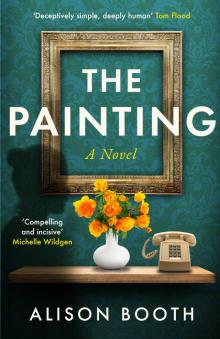 The Painting
The Painting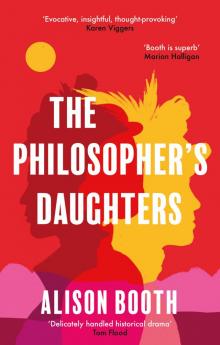 The Philosopher's Daughters
The Philosopher's Daughters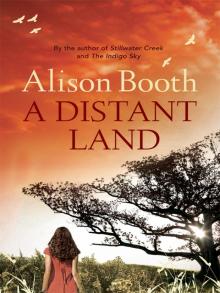 A Distant Land
A Distant Land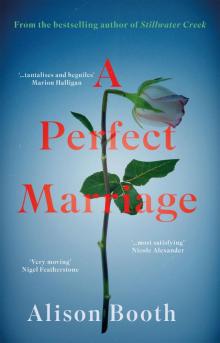 A Perfect Marriage
A Perfect Marriage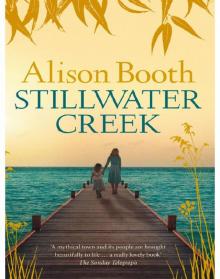 Stillwater Creek
Stillwater Creek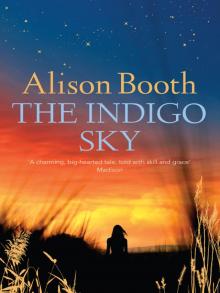 The Indigo Sky
The Indigo Sky